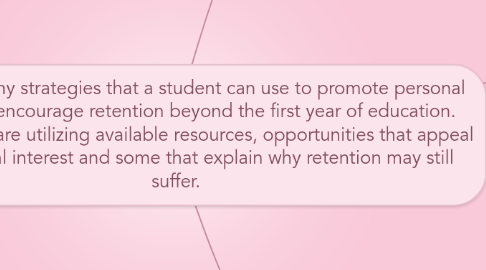
1. Retention Still Suffers "Retention is everyone's responsibility, in effect it becomes no one's responsibility." (Kurtz; Wick; RuffaloNL.com
1.1. Everyone's Responsibility
1.1.1. While everyone may believe the needs of the student must be supported, it can be easy to assume someone else will lead the main effort. Students may find difficult to locate the best source of information to support the individual needs.
1.1.2. When the student is not seeking information nor is it being pushed, the student is likely to miss vital deadlines. In turn opportunities can be missed, success not attained and retention not an a goal due to a discouraging experience.
1.2. Staff Interest/Ability
1.2.1. If a "retention champion" (Kurtz; Wick; RuffaloNL.com) has not been identified by the institution other staff members, while available, may not be proactive or focused specifically on the students success.
1.2.2. Without proper training or a supervisor such as the "retention champion" (Kurtz; Wick; RuffaloNL.com) that advocate and focus on organized methods of student support and retention, staff members will only do what is believed to be necessary.
1.3. Online vs Face to Face
1.3.1. Some students do not feel supported in an online environment due to the lack of personal interaction. When this happens and the student doesn't feel welcome the potential to return not likely.
1.3.2. Some instructors do not feel the need to have interaction with the hundreds of face to face students within the courses. When there is only a one way relationship the student may expect to find this throughout the rest of the institution
1.3.3. The student must be willing to tolerate the relationship to be able to move forward. If the relationship is not supportive to the student there may not be forward progress.
2. Appeal to Personal Interest
2.1. Institutional Commitent
2.1.1. Many institutions support students by "developing many services designed to integrate first-time students into the institution." (Crosby; Dalton, 2014) The students feel welcomed by the many programs focused towards their success.
2.1.2. The institution shows dedication to the students by aligning students with programs and professionals within the same field of study. The institution also treats all available fields of study with the same degree of importance reassuring students that they have the institutions focus and support.
2.1.3. Facilities and activities are created for the needs of the students and the various fields of study. The activities and supportive services are readily available, easy to use and redundancy is minimized as best possible. (Wick; RuffaloNL.com)
2.2. Communication is the key to success
2.2.1. Potential students that receive early communication from staff members, even prior to attendance, allow the student to feel welcomed and able to expect communication to continue throughout the education plan.
2.2.2. Parents of potential students are just as important, as the students themselves, to be kept informed of opportunities available within the institution. (Wick; RuffaloNL.com)
2.2.3. Students do not have to take the time to research a reliable or available source of information about their line of study, it is pushed to them from the institution and the dedicated staff members.
3. Available Resources "Helping students succeed can't be an afterthought" (McClenney; Waiwaiole, 2005)
3.1. Educational Case Management
3.1.1. Student education plans are managed by an academic adviser which is there to help each student ensure the best academic plan is put in place to keep moving forward. The students receive support helping monitor the academic planning, goal-setting, barriers and removing them, grades and progress, activities to help with development, and transition to employment. (McClenney; Waiwaiole, 2005)
3.1.2. If there are any concerns or a need for modification of the education plan the academic adviser will communicate to the student to ensure as little or no interruption and to keep the student moving forward. (McClenney; Waiwaiole, 2005)
3.1.3. One community College student described his experience, "Advisement was very helpful. They're always very helpful. I have my own mentor, so I go to him every semester when I want to enroll for classes. I know I'm on the right track." (McClenney; Waiwaiole, 2005)
3.2. Peer Mentoring and Coaching
3.2.1. Coaches do not wait for the student to make contact, "coaching contacts with students are usually most frequent during the summer and fall of the first year when new students are in the transitional phase of matriculating and adjusting to college." (Crosby; Dalton, 2014)
3.2.2. Through the coaching programs students may have the opportunity to be partnered with a life coach that posses the same values and professional goals that can help keep the students education plan aligned with the requirements of the intended end state.
3.2.3. Students are paired with peers and other returning students in the same field of study and receive a first hand example of a successful student and some strategies to follow. The returning student can advocate for the programs and resources available to the new student sharing past experiences with the programs.
